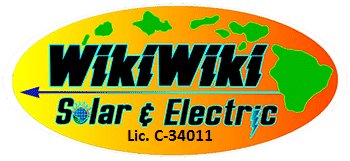Effects of Weather Conditions on The Productivity of the Maui Solar System
Most people are under the impression that solar panels work better on a hot sunny day, but in reality, they work even better in cold weather. This is because solar panels extract energy from the sunlight, not its heat.
When you install the best Maui Solar System you are actually using the photovoltaic cells to collect photons from sunlight that are converted into electricity. This is not to say that temperature doesn’t have an impact, because it does. The temperature can have a direct impact on a solar panels ability to efficiently produce power. Which we’ll discuss more about, below.
Why More Heat Results in Low Energy Production?
When the solar panels are exposed to more heat, it activates electrons and lets them reach a high-energy state. The production of solar energy depends on the difference between the resting and high-energy state of the electrons. Heated electrons will reach a high energy state while at rest, and the difference between their resting and high energy state reduces drastically, which results in lesser energy production. On the other hand, low temperature keeps electrons cool in the resting phase, and it increases the difference between the resting and high-energy state of electrons. Automatically improving the energy production capacity of the Maui Solar System.
How does the solar system perform on a cloudy day?
Anything that hinders the sunlight will decrease energy production. If the solar panels are not receiving ample sunlight then they will not be able to produce as much energy as they are capable of producing on a sunny day.
Will snowfall affect the performance of the Maui solar system?
Maui isn’t known for snowfall. However, the question is still valid… Will solar panels be negatively impacted by snowy weather? A mild snowfall is good as it helps to clean the solar panel surface. Snow won’t drastically reduce production so long as the sunlight is able to pass through the thin layer of snow.
Panels are typically tilted at an angle to allow them to catch the reflection of sun rays more efficiently. This inclination also helps to avoid massive accumulation of snow on the panels and helps them to absorb maximum sunlight.
Interestingly, a big snowstorm might boost the productivity of a Maui Solar System as the snow around the solar panels would help draw in the reflection of sunlight more aggressively. Unless it causes any physical damage to the panels, snowy weather would be more beneficial than harmful for solar panels.
Can wind decrease the power production capability of solar panels?
No! Rather, wind reduces the atmospheric temperature and helps to increase energy production by solar panels. The wind keeps the solar panels cool and boosts their efficiency. However, the wind might have some adverse effects in that it might cause other damage to the Maui Solar System from debris.
Are rain & fog harmful to solar panels?
People think that there will be less energy production on a foggy or rainy day. In fact, solar panels produce 10-30 percent more electricity on a cloudy day. Rain washes away the dust and dirt on the solar panels and makes them more effective. However, heavy rainfall, a large hailstorm, lightning, hurricane, or high-velocity winds can damage a Maui Solar System, but such situations rarely occur.
Conclusion:
As you know, weather conditions are continuously changing. The good thing is, your Maui Solar System is likely to thrive through most weather conditions. Consult WikiWiki Solar & Electric for your solar panel installation now!
